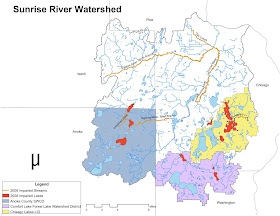 |
| Minnesota Pollution Control Agency |
Hi! Come on in. Yesterday we talked about the Anoka Sand Plain. We also live in the Sunrise River watershed, which is part of the larger St. Croix River watershed, which, in turn, flows into the Mississippi River watershed and then into the Gulf of Mexico, from which water evaporates, is often carried north, falls as rain and ends up in the Sunrise River watershed. We just covered much, but not all, of the hydrologic cycle. Gary Snyder and bioregionalists think we should know in which watershed we live. (When I'm at work, I'm in the Mississippi watershed.) Many of the waters in the Sunrise River shed (and elsewhere in Minnesota) are "impaired," that means they don't meet one or more standards to be suitable for fishing and swimming. I suspect that watersheds are going to become more and more important in My Minnesota as we find ourselves facing more and more situations like that in the White Bear Lake watershed. The lack of alignment between political boundaries (see those straight lines around the blue shading up above?) complicate resource management issues. As one of our favorite authors, Bill McKibben, is supposed to have said, "The laws of Congress and the laws of physics have grown divergent, and the laws of physics are not likely to yield." Think about it. On a brighter note, the MNDNR habitat study we talked about yesterday mentioned Blanding's turtles, hognose snakes and bullsnakes. Since living in the area, we've seen all three. Also supposedly common in Minnesota is the redbelly snake. We saw one of those last year and another (I think it was another and not the same) this year, but never before that we remember. All this talk about snakes reminds me of an Emily Dickenson (she's a New Englander, you know) poem, The Snake :
A narrow fellow in the grass
Occasionally rides;
You may have met him, — did you not,
His notice sudden is.
The grass divides as with a comb,
A spotted shaft is seen;
And then it closes at your feet
And opens further on.
He likes a boggy acre,
A floor too cool for corn.
Yet when a child, and barefoot,
I more than once, at morn,
Have passed, I thought, a whip-lash
Unbraiding in the sun, —
When, stooping to secure it,
It wrinkled, and was gone.
Several of nature's people
I know, and they know me;
I feel for them a transport
Of cordiality;
But never met this fellow,
Attended or alone,
Without a tighter breathing,
And zero at the bone.
Thanks for listening. Come back when you can. Rants, raves and reflections (and sometimes poetry) served here daily.
No comments:
Post a Comment